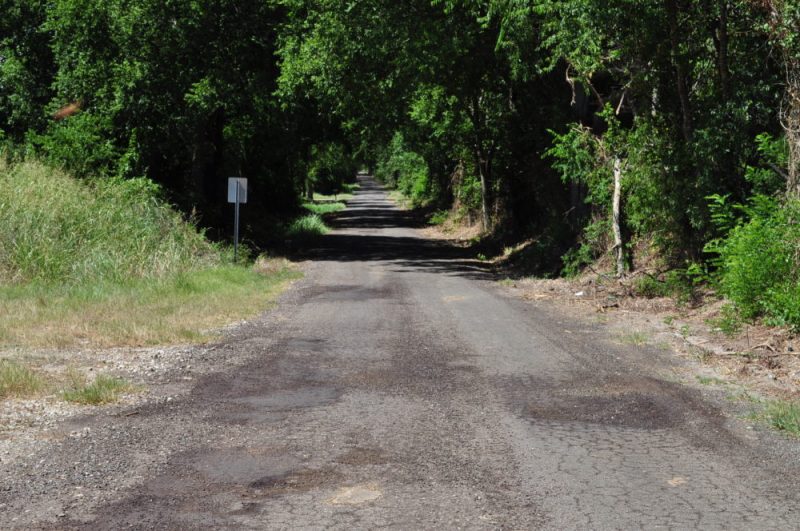
by Allison Bledsoe
County roads are a necessity for the rural communities that bring Hopkins County to life, but very few inhabitants know much about them and how they are maintained. We’re bringing our readers back to the basics with a quick lesson on county roads and what just exactly they entail.
County roads are defined as public roads that have been accepted for maintenance by the Commissioners Court to the standards set by the Commissioners Court. Roads are classified as first, second, and third class. To give a little more definition to our terminology, each county is separated into four precincts. Each precinct is governed by one of four Commissioners. The Commissioners then answer to the Commissioners Court that is governed by the County Judge. A County Commissioner independently has no authority to establish a county road or change it’s status. In Hopkins County, the current Commissioners Court is composed of Judge Robert Newsom, Beth Wisenbaker, Mike Odell, Wade Bartley, and Danny Evans.
In Chapter 251.004 of the Transportation Code, it is stated that County Commissioners are the supervisors of the public roads in a county unless the county itself adopts an optional system of administering the responsibilities. Five different road management options exist currently. The first is the Road Supervisor System, within this system County Commissioners are supervisors of public roads in unincorporated areas of the county and supervise the public roads in the Commissioner’s precinct at least once each month and provide a report during the ninth month of the county’s fiscal year. A close alternative to this management plan is the ExOfficio Road Commissioner System. The County Commissioner takes care of the roads in his or her precinct, such as laying out new roads, construction or changing of new roads, and the construction of bridges. With authorization from the Court, the Commissioner may hire employees that are hired from the county road and bridge budget. The County Commissioner under the ExOfficio system must also provide a road report, much like the Road Supervisor System.
The third option is the Road Commissioner System, this is where things begin to differ in a sense of what is normal to inhabitants of Hopkins County. Four precincts, four Commissioners, and the Commissioners Court still exist, but 1-4 Road Commissioners are employed under the supervision of the Commissioners Court. Road Commissioners may operate in a system where the road districts are countywide or consolidated. The Road Commissioners are expected to ensure that all bridges and county roads are in good condition, as well as to establish a system of grading and draining public roads. The Road Commissioners spend funds on public roads, bridges, and culverts. Under this system, Road Commissioners are required to give regular reports to the Commissioners Court. In the fourth option, the Road Superintendent System, it is very similar to the Road Commissioner System. Each county or precinct is assigned a Road Superintendent that will serve a two-year term. The Road Superintendent is under the general supervision of the Commissioners Court. He or she directs the laying out of roads, construction, as well as grading and drainage of the road systems. The only major difference is that the Road Superintendent must file a sworn report at each regular term of the Commissioners Court.
The fifth option is a little more complicated, especially in regards to how it must be implemented in the beginning stages. The County Road Department System is it’s own department that is ran by a County Engineer. The Commissioners Court is still involved, but as a policy-making entity rather than the head of the public road system. The Commissioners Court appoint a licensed engineer. There is no time limit on his or her term. In the event that the county cannot hire an engineer, a County Road Administrator may be appointed. The Engineer and Administrator both make vital decisions like hiring and firing. The only requirement for this position is experience in maintenance, road building or other types of construction. In this system, road activity such as construction or maintenance is to be based on the whole county. Precincts or districts do not play a role in the use of county equipment, road construction, or maintenance. All resources are spread among the entire county.To implement the County Road Department System a petition signed by %10 of the numbers cast in the last election for governor, then is certified by the clerk and then the change may be voted on in the next election.
The last component of the road system is the road report that each Commissioner, Road Engineer, Road Administrator, etc., is expected or required to complete in the ninth month of the counties fiscal year. All Texas counties are required to track the cause of the degradation of roads and keep these records in the event that the county is audited. The Road Report must contain the amount of money needed for maintenance of the roads for the next fiscal year, the condition of each road, culvert and bridge in the Commissioners precinct, the number of traffic control devices broken or defaced in the year, any new road that should be opened, and the reason for any road, culvert or bridge degradation.
The Hopkins County road system falls under the ExOfficio system. Several of the surrounding counties are also ExOfficio, but Rains County has implemented the fifth option, the County Road Department. Fannin County is the closest reported county to Hopkins that has adopted the Road Commissioner System.






